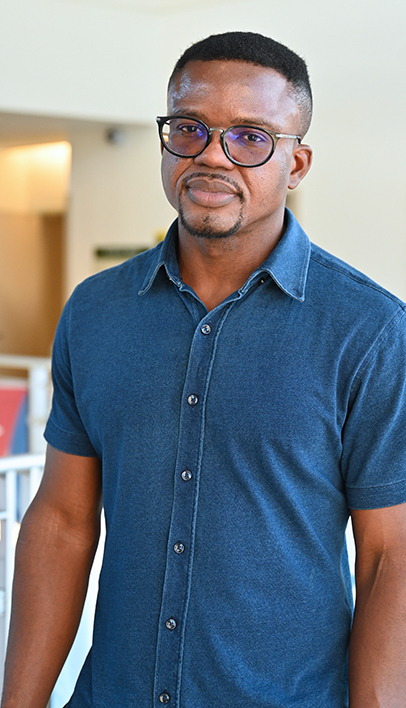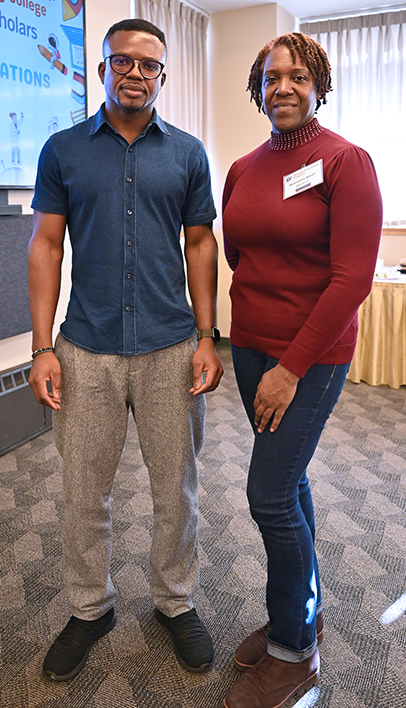Student Spotlight


Solomon Asotie and mentor Roxanne West, professor of surgical technology
Solomon Asotie
Major: Surgical Technology
CUNY Research Scholars Program
Solomon Asotie's path to Kingsborough Community College began thousands of miles away in Nigeria and took unexpected turns before landing him in an operating room. "I moved to the United States in 2016 with dreams of becoming a pilot, but life had different plans for me," he shared. “My father fell seriously ill, and as a family, we made the difficult decision to prioritize his health. He was retired, and I knew I had to step up. With the weight of responsibility on my shoulders, I put my aviation dreams on hold and took my first job in the States—as a housekeeper at NYU Langone.”
Asotie didn’t realize that job was the start of a journey. “I moved up to patient transporter, spending more time around the hospital, and learning the rhythms of patient care. Eventually, I became a nursing assistant in the operating room, where I found myself drawn to the precision, teamwork, and intensity of surgery,” he recalled. “My experience in the operating room sparked my interest in surgical technology, leading me to KCC to gain hands-on training in this field. What started as a detour became a calling, leading me to where I am today—on the path to becoming a surgical technologist and possibly even a nurse anesthesia provider in the future."
That interest has now evolved into a focused research project through the CUNY Research Scholars Program (CRSP), where Asotie is focusing on protecting healthcare workers by testing how effectively surgical masks and N95 respirators filter harmful particles generated during surgical procedures.
CRSP aims to increase the participation of high-achieving CUNY community college students in faculty-mentored research, particularly in STEM fields, providing a stipend and opportunities for research and professional development. "This research has helped me develop critical thinking, data analysis, and scientific writing skills," he said. "I've learned how to conduct literature reviews and present complex information clearly."
The research question came naturally to Asotie after his time in the operating room. "I've seen firsthand how surgical instruments like lasers and electrosurgical tools burn tissue and create smoke," he explained. "What most people don't realize is that while 95% of surgical smoke is water vapor, the remaining 5% contains toxic chemicals, viruses, and cellular debris."
This smoke creates an occupational hazard that many operating rooms don't adequately address. Despite the risks, Asotie discovered that smoke evacuation systems aren't consistently used in hospitals—a gap in safety protocols he hopes his research might help close.
Working with his mentor, Prof. Roxanne West, was invaluable to him. “She provided me with focus and direction, particularly when I felt overwhelmed by the various aspects of the research,” he noted. “Her guidance on narrowing my scope to focus specifically on mask filtration with and without smoke evacuators helped streamline my approach and make the project more manageable.”
The first in his family to attend college, Asotie believes in education as a pathway to growth and opportunity. “My decision to pursue higher education was driven by my ambition to build a meaningful career, particularly in healthcare, where I can make a real impact.”
When Asotie graduates in December 2025, he plans to work as a certified surgical technologist while continuing his education. He's considering transferring to another CUNY or SUNY school for a bachelor's degree in health sciences. "I might pursue becoming a nurse anesthesia provider, but I'm keeping an open mind."
Whatever path he chooses, he intends to share his research findings widely. "I plan to present at symposiums and conferences," he said. "If possible, I'd like to publish in a relevant medical journal to reach more healthcare professionals."
Asotie is considering expanding his research to explore the effectiveness of different surgical smoke evacuation systems and how their implementation varies across hospitals. He hopes his work might one day make operating rooms safer for the professionals who spend their careers there—people just like himself. " Life has a way of redirecting us, but sometimes, the unexpected turns lead to the most meaningful destinations,” he reflected. “From working in the operating room as a nursing assistant to now training as a surgical technologist, I’ve developed a deep appreciation for the field. I’m excited about the opportunities ahead and look forward to making a meaningful impact in healthcare.”
